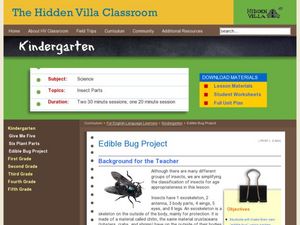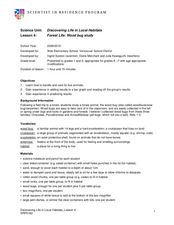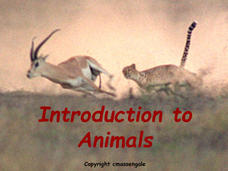Curated OER
Goals of the Diversity of Life Unit
Students are introduced to the unit on the importance of diversity of life and the role that interdependence plays in our worlds. this is part of a multi-lesson unit on the diversity of life.
Curated OER
What is Diversity of Life?
Students are introduced to the variety of organisms in our world. this lesson is a part of a multi-segmented unit on specie diversity. this segment explores distribution of life on land and sea.
Curated OER
Kingdom Animalia
Students are introduced to the basic characteristics of the animal kingdom. this activity is part of a multi-segmented unit on the diversity of life. In this segment, students explore the the members of a few phyla of the animal kingdom.
Curated OER
Tackling Taxonomy
Students study physical characteristics of separate phyla and place them into similar groups. This lesson is part of a multi-segmented unit on the diversity of life. students develop a classification system by grouping animals into...
Curated OER
Creative Classification
Students create an animal by using physical characteristics to classify that animal in the Linnaean Classification System. This lesson is part of a multi-segmented unit on the diversity of life.
Curated OER
Missing Links
Students change one animal group into another animal group by changing only a few body characteristics. This lesson plan is part of a multi-segmented unit on the diversity of life. In this session, students the basis of classification.
Curated OER
Diversity Debate
Students investigate the importance of dependency and diversity in a rain forest ecosystem. This lesson plan is part of a multi-segmented unit on the diversity of life.
Curated OER
Superhumans and Bionics: Building Hi-Tech Exoskeletons
Students explore how the body works. Students experiment and participate in activities to compare speed to stride length. Using the data collected, students draw conclusions about the biology of dinosaurs, their speed and stride length.
Curated OER
World of Insects
For this biology worksheet, students identify and locate various vocabulary terms related to the world of insects in the puzzle. There are 51 words to locate in the word search.
Curated OER
Arthropods
In this arthropods worksheet, students will review the 4 characteristics of arthropods and then use a lobster diagram to complete 2 short answer and 1 true or false question.
Curated OER
Body Plans and Adaptations
In this body plans and adaptations learning exercise, students will review the different types of symmetry found in organisms. Students will identify body parts as found on either the ventral or dorsal part of an animal. Then students...
Curated OER
Marine Animal and Plant Adaptations
Young scholars examine nature by creating their own animals. For this animal adaptation lesson, students define scientific vocabulary terms dealing with adaptation such as sea stars, sea cucumbers and exoskeleton. Young scholars utilize...
Curated OER
Moving and Growing
Learners know that humans and some other animals have bony skeletons inside their body. They know that other animals have skeletons on the outside of their bodies. They explain the role of both kinds of skeletons.
Curated OER
Art: Go Ahead and Bug Me!
Students research arthropods, and identify the differences between vertebrates and invertebrates. After comparing and contrasting insects and arachnids, they create drawing of them that are anatomically correct. Students place their...
Curated OER
Edible Bug Project
Students recognize the characteristics of insects. In this edible bugs lesson, students observe the body parts of an insect. Students create an edible insect using a grape, carrot sticks and sorrel stems and leaves. Students share the...
Desert Discoveries
Amazing Arthropods
Arthropods are the stars of a fine science lesson. Learners look at the diversity, characteristics, adaptations, and important roles that these insects play in the Sonoran Desert environment. A terrific document called "Amazing...
Curated OER
Conservation in Small Spaces: Butterfly Life cycles
Students discuss ways that butterflies and moths change during their lifecycles, observe caterpillars, and explore how their different body parts work.
Curated OER
Forest Life- Wood Bug Study
Examine wood bugs and their habitat. Learners gather wood bugs and examine their bodies. Then discuss their body parts and how they help them survive. They also predict where they think wood bugs live to then graph the class results.
Curated OER
Bug's Eye View
Investigate the life of bugs and how they interact with the environment in this integrated science and language arts lesson plan. Young scientists construct mini environments in cages in order to make observations. This data forms the...
Curated OER
Reading Comprehension 1
What can jump 150 times its own length? Fleas! Assign this reading passage to your class, and they'll not only develop reading skills, but they'll learn about fleas. After reading the excerpt, they answer the questions that follow. All...
Curated OER
Insects?
Can you tell the difference between a bug and an insect? Aren't they the exact same thing? Let your learners explore, identify, classify, and document the differences they see in bugs and insects. The activity sheet suggests several...
Busch Gardens
Create an Invertebrate
What better way for young biologists to learn about invertebrates than by creating their very own? Here, students are assigned a set of invertebrate characteristics and are asked to invent an imaginary ocean animal and a separate...
Biology Junction
Introduction to Animals
Out of all animals, elephants alone lack the ability to jump. Scholars learn all about animals using a presentation full of fun examples. It describes different types of animals, the biological similarities and differences between...
Biology Junction
World of Insects: Characteristics, Orders, and Collecting
Every bug is an insect, but not all insects are bugs. A presentation lists the characteristics of insects, describes their body parts, and explains metamorphosis. It also details every order and includes photographs and multiple facts...

























